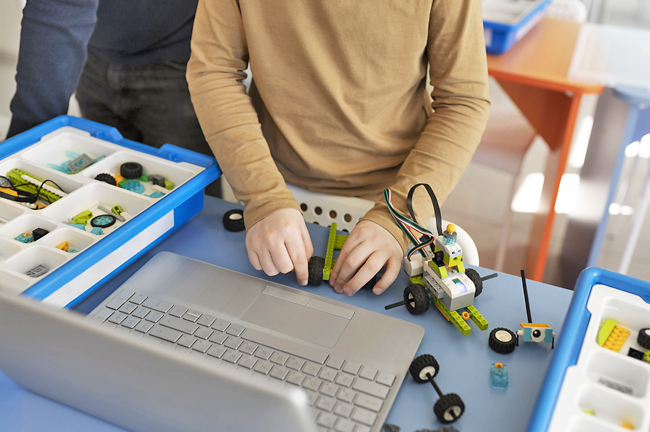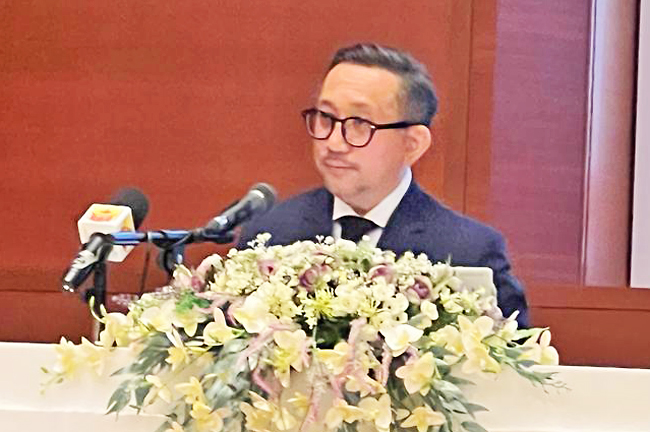Technological advancements and the widespread adoption of digital technologies have created many opportunities for innovation and disruption across various sectors. In this fast-paced era of technological and scientific progress, it’s vital to ensure that these innovations are accessible to all, regardless of socio-economic background, gender or location.
Inclusive science aims to remove barriers that have traditionally excluded marginalised groups from participating in scientific progress. It fosters opportunities for everyone to engage in scientific discussions and benefit from these advancements.
In Southeast Asia, a region with rich diversity and dynamic growth, inclusive science is crucial for developing sustainable and effective solutions to regional challenges. By embracing diversity, we advance not just science but society as a whole.
These key points were highlighted by Permanent Secretary at the Ministry of Transport and Infocommuncations (MTIC) Ir Haji Mohammad Nazri bin Haji Mohammad Yusof in his keynote address titled ‘Inclusive Science Education for Regional Advancement’ during the recent 7th Southeast Asian Ministers of Education Organisation (SEAMEO) Centres Policy Research Network (CPRN) Summit 2024.
The permanent secretary emphasised the importance of giving everyone the opportunity to contribute to technological development from the beginning, promoting inclusivity and diversity in innovation and research. In Brunei, multiple platforms help shape science and innovation policies. The Ministry of Education, supported by various academic institutions, plays a key role in providing STEM (science, technology, engineering and mathematics) education and nurturing early talent.





Complementing this educational base is the Science and Innovation ecosystem, supported by the Council for Research and Advancement of Technology and Science (CREATES), established in 2021 under the MTIC.
Innovation in the private sector is backed by Darussalam Enterprise (DARe), which fosters micro, small, and medium-sized enterprises (MSMEs) and local start-ups.
Meanwhile, the Brunei Darussalam Economic Development Board (BEDB) promotes foreign direct investment, facilitating technology and knowledge transfer. From a regional perspective, Brunei is represented by the MTIC in the ASEAN Ministerial Meeting on Science, Technology, and Innovation (AMMSTI) and the ASEAN Committee on Science, Technology, and Innovation (COSTI).
ASEAN COSTI
As the Brunei Chairperson of the ASEAN COSTI, the permanent secretary explained that it serves as a central hub for coordinating science and technology initiatives across the region, shaping policies and fostering collaboration among member states.
This collaborative framework aims to build scientific capacity, promote technological innovation, and crucially, ensure that the benefits of these efforts reach every corner of ASEAN.
“Inclusive science is about breaking down barriers – barriers that have historically prevented marginalised communities from accessing and contributing to scientific progress.
“It is about creating opportunities for all to engage in the scientific dialogue and to benefit from the advancements that science brings. By doing so, we are not just advancing science; we are advancing society,” said Ir Haji Mohammad Nazri.
Moreover, disparities in access to technology, education, and resources across regions can be as diverse as our cultures. Science and technology have the potential to level the playing field, but this requires a commitment to inclusivity.
Our scientific communities must reflect the demographics of our populations, encouraging innovation that transcends traditional silos and boundaries as this approach is crucial for tackling complex regional issues like climate change, public health, and sustainable development.
The permanent secretary believes that inclusive science also aims to inspire the next generation by demonstrating that science is for everyone. It involves creating an environment where every child, regardless of their background, can aspire to and achieve their scientific potential, ultimately fostering a more inclusive and sustainable future.
INCLUSIVE SCIENCE
“The key benefit of inclusive science lies in its ability to foster an environment where varied cultural insights and indigenous knowledge systems are integrated into mainstream scientific research,” said the permanent secretary.
“This integration not only enriches the scientific discourse but also ensures that the solutions we develop are well-suited to the specific needs and contexts of our diverse communities.”
By embracing the diverse perspectives of all ASEAN member states, Ir Haji Mohammad Nazri said that we are better equipped to address complex regional challenges such as climate change, biodiversity loss, and food security.
Under the ASEAN COSTI, a key focus is supporting applied research, translating scientific knowledge into practical applications that solve real-world problems and promote technological innovation. This approach ensures that advancements in science are effectively harnessed to tackle pressing issues, foster sustainable solutions, and drive progress across various fields, from healthcare to environmental conservation and beyond.
Inclusive science amplifies the impact of collaborative scientific efforts. Scientists and researchers from varied backgrounds bring unique skills and knowledge, fostering creativity and innovation. Studies suggest that diverse teams produce more impactful scientific output, thanks to their broad range of expertise.
The economic benefits of inclusive science are significant and by engaging a wider range of participants in scientific activities, we expand the innovation pipeline, driving technological advancements and stimulating economic growth.
Moreover, inclusive science practices ensure that the benefits of research and development are shared across the region, contributing to a more resilient and dynamic scientific community.
INCLUSIVE SCIENCE EDUCATION
“The cornerstone of fostering an inclusive scientific community lies in our approach to education,” highlighted the permanent secretary.
An inclusive science education framework ensures that future generations are equipped not just with knowledge but also with a commitment to inclusivity, a key factor for sustainable regional advancement.
ASEAN has implemented various initiatives and strategies to create a more inclusive educational landscape in science and technology.
One significant effort involves harmonising educational standards across ASEAN, ensuring that students from different countries receive comparable science and technology education. This harmonisation fosters regional cohesion and allows talent and ideas to move freely across borders, facilitating collaborative research and development.
Another critical aspect of inclusive science education is engaging underrepresented groups.
Special programmes and scholarships target young women and rural youth, aiming to break down historical biases and provide these groups with opportunities to participate in and benefit from scientific advancements.
This proactive approach helps create a more diverse and inclusive scientific community that encompasses a wide range of talent and perspectives.
ASEAN also emphasises teacher training to support inclusive teaching practices.
Workshops and professional development courses are designed to help educators work effectively with students from diverse backgrounds. These programmes stress culturally responsive teaching methodologies, crucial for engaging students from various cultural and economic backgrounds, ultimately promoting a more inclusive science education system.
INCLUSIVE SCIENCE POLICIES AND PRACTICES
“Policies serve as the backbone of our efforts to ensure that the scientific field is accessible and beneficial to all, regardless of gender, ethnicity, or economic status. To truly achieve the goals of inclusive science, we must enact and enforce policies that actively promote diversity and inclusivity at every level of scientific inquiry and application.”
The permanent secretary noted that global examples that demonstrate the impact of inclusive science policies such as the European Commission’s focus on gender equality in research, implementing strategies that require institutions to have gender equality plans when seeking funding, to promote a balanced representation in research and innovation, leading to more diverse and effective solutions. He believes that ASEAN could adapt similar measures to promote inclusivity, and beyond gender equality, integrating indigenous knowledge into scientific research is gaining traction.
Countries like Canada and New Zealand have successfully incorporated indigenous perspectives into their scientific frameworks, enriching understanding of local ecosystems and contributing to sustainable environmental practices.
ASEAN has made significant strides in promoting inclusivity in science with policies emphasise inclusivity in education and employment, ensuring individuals from all backgrounds can benefit from scientific advancements, and efforts to improve the accessibility of scientific education and resources have been crucial in creating a more level playing field across the region.
However, the permanent secretary believes there is still work to be done as policies must evolve to address new technological advancements, ensuring fairness and equity.
Collaborative efforts among ASEAN member states are vital for setting regional standards for data sharing, ethical research practices, and equitable resource allocation.
Ultimately, ASEAN’s strength lies in its collective effort.
“It is imperative that we, as a region, continue to lead by example, demonstrating our dedication to creating a scientific community that is truly inclusive.
“Let us pledge to continue our efforts in making science open and accessible to all, thereby ensuring that the benefits of our scientific endeavours are shared equitably across Southeast Asia and beyond.” – Rokiah Mahmud





